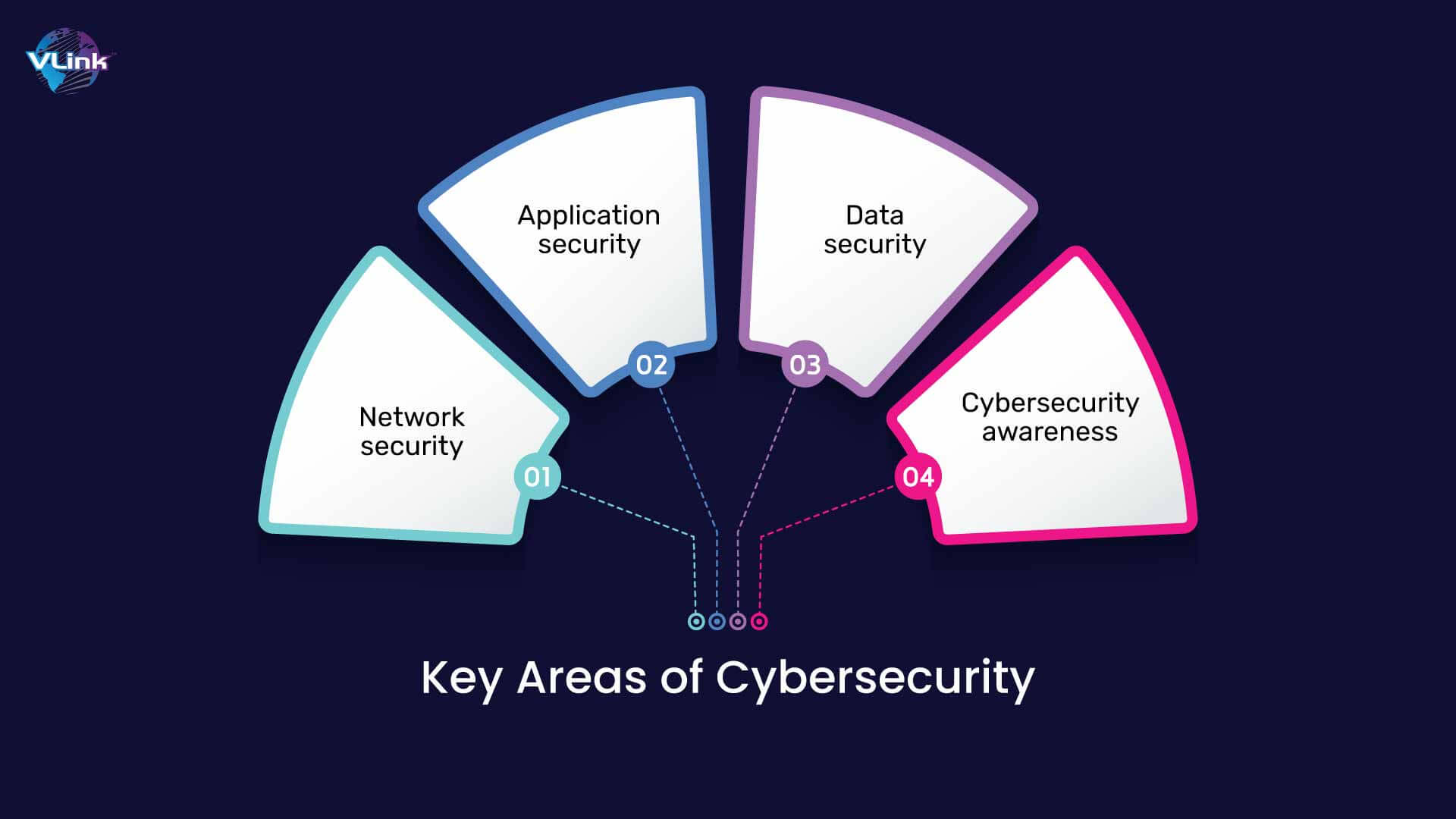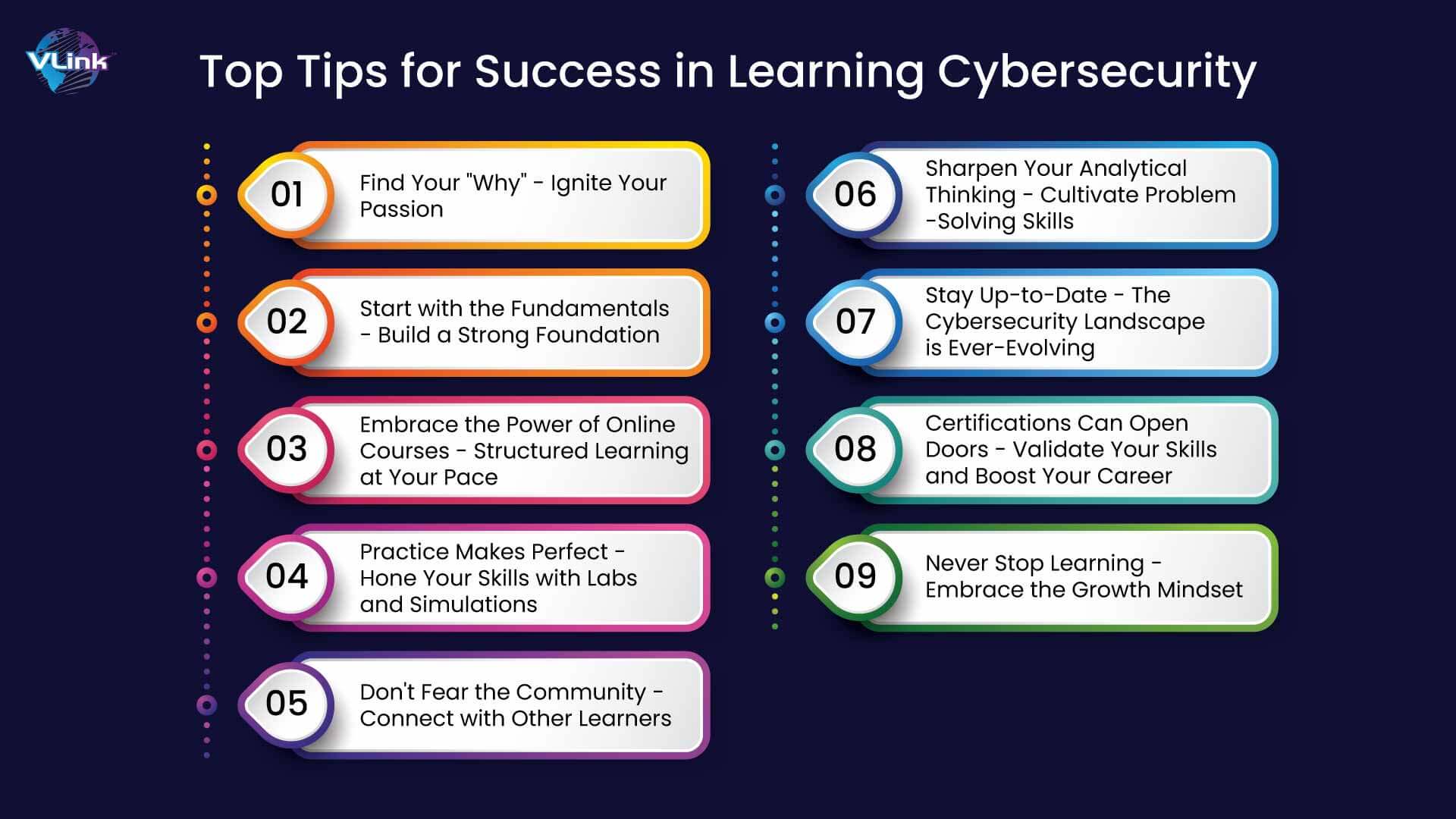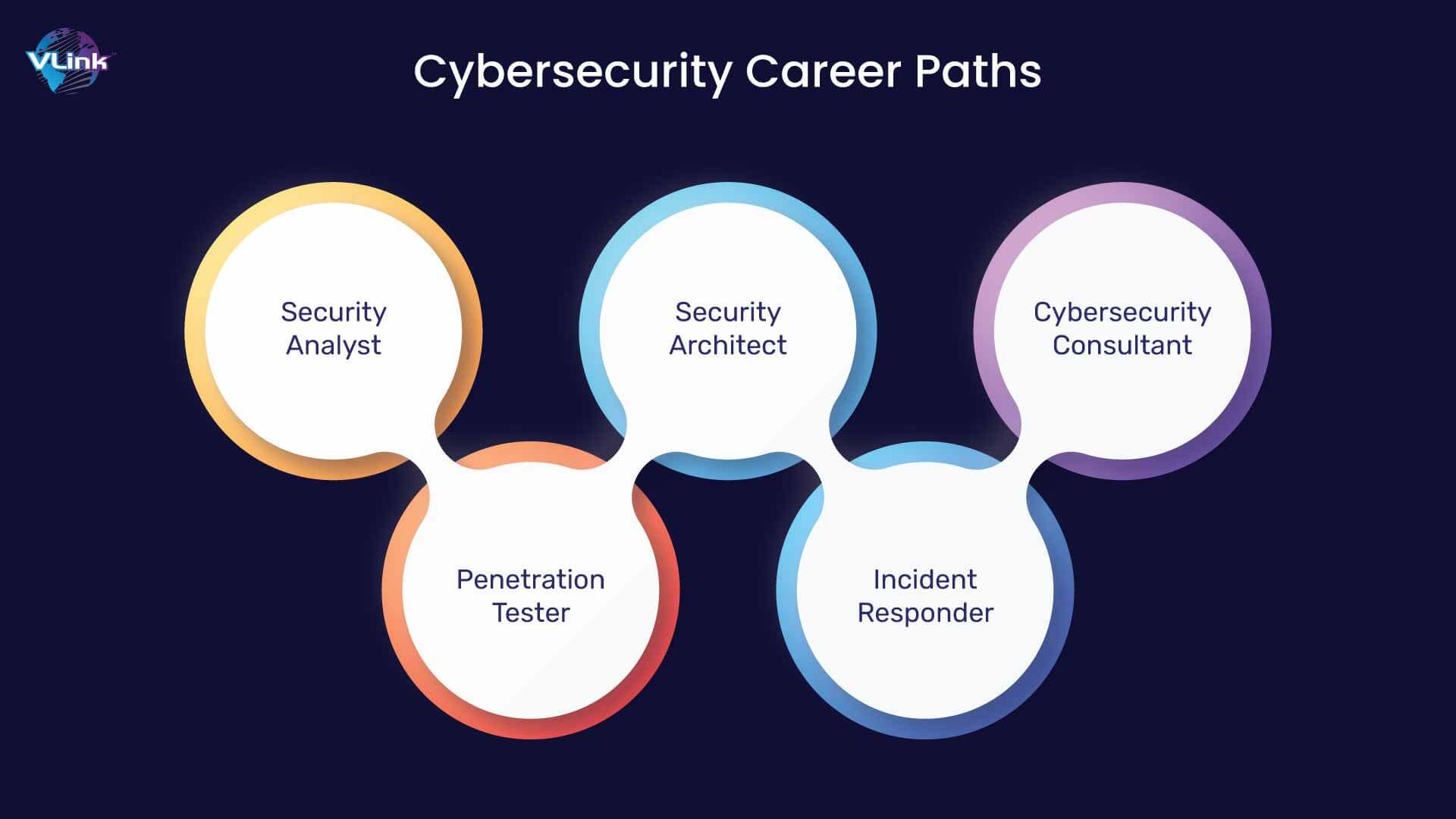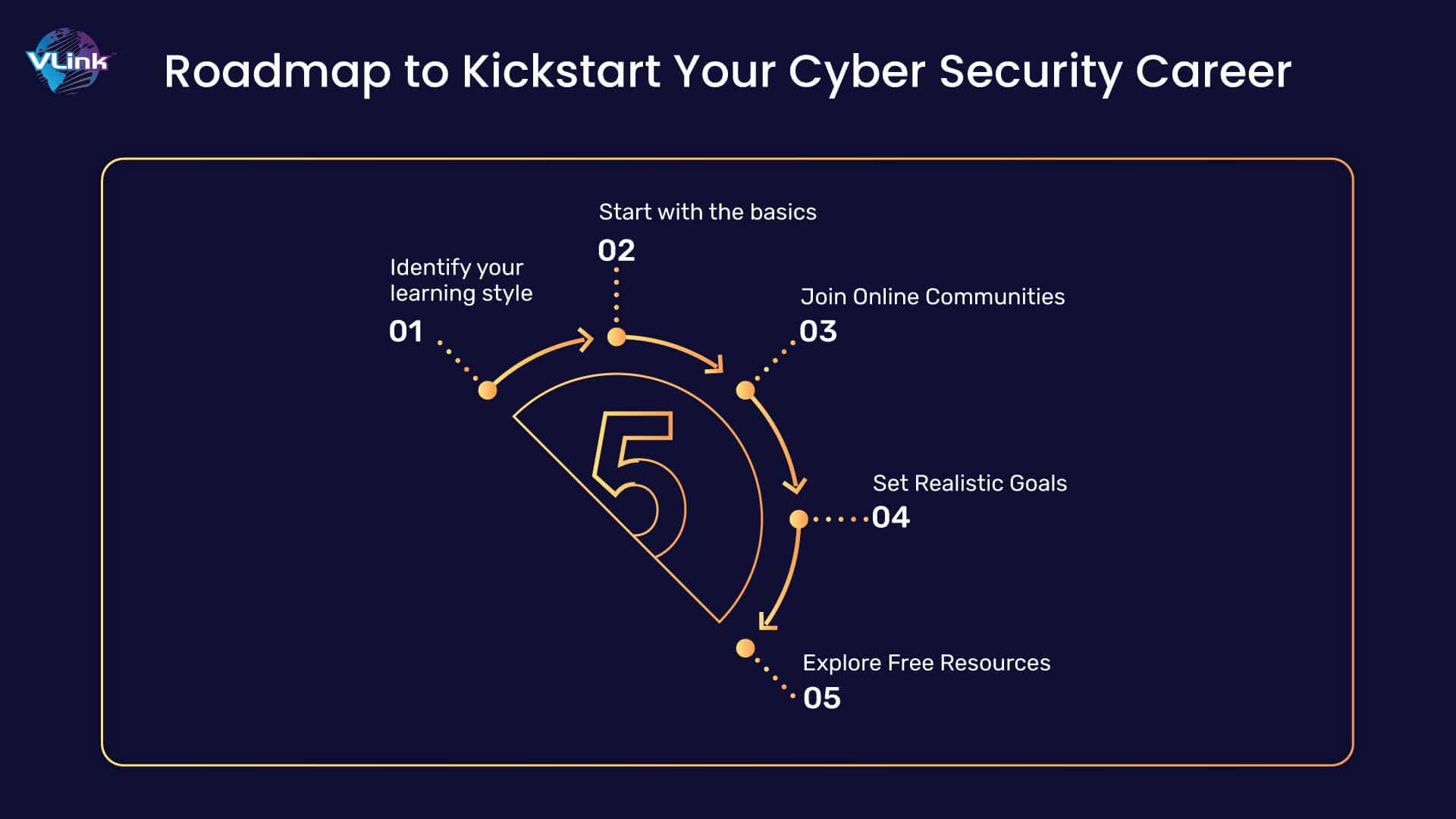The digital age thrives on convenience and connection, but it's also opened doors for those who exploit our reliance on technology. Cybersecurity has become the frontline defense, safeguarding our data, privacy, and critical infrastructure from cyberattacks.
But maybe you're wondering, "Is cybersecurity hard to learn?" Like most things in life, the answer isn't a simple yes or no. It depends on your background, learning style, and dedication. This comprehensive blog dives into the world of cybersecurity learning. We'll explore its valuable tips to smooth your journey and, ultimately, empower you to decide if this exciting field is the right fit for you.
What is Cybersecurity?
Cybersecurity is the practice of safeguarding computer systems, networks, and data from digital attacks. In today's increasingly interconnected world, where information is the new currency, protecting digital assets is paramount.
Think of cybersecurity as a fortress designed to shield valuable information from cyber criminals constantly seeking to infiltrate and exploit vulnerabilities. These digital intruders can range from opportunistic hackers to highly organized cyber gangs with sophisticated tools and techniques.
Cybersecurity aims to prevent unauthorized access, use, disclosure, disruption, modification, or destruction of information. It involves a combination of technologies, processes, and practices to build a robust defense against cyber threats.
Key areas of cybersecurity include:

- Network security: Protecting computer networks from intruders.
- Application security: Safeguarding software and applications from vulnerabilities.
- Data security: Protecting digital information from unauthorized access, use, disclosure, disruption, modification, or destruction.
- Cybersecurity awareness: Educating individuals about best practices to prevent cyberattacks.
Cybersecurity is essential for everyone, from individuals protecting their personal data to businesses safeguarding sensitive customer information. As technology evolves, so do the threats, making cybersecurity an ongoing challenge that requires constant vigilance and adaptation. Cybersecurity encompasses a broad range of disciplines, each with its complexities.
Here's a glimpse into some core areas you'll encounter:
- Networking: Understanding how computer networks function, their vulnerabilities, and the strategies to secure them. Think of it as learning the intricate pathways of information flow and identifying potential weak points.
- Operating Systems: Familiarity with operating systems like Windows, Linux, and MacOS, along with their built-in security features. It's like understanding your computer's different languages and the security measures each language offers.
- Cryptography: Art of keeping data confidential and ensuring its integrity. It involves encryption and decryption techniques, essentially scrambling and unscrambling information to keep it safe from prying eyes.
- Security Tools: Mastering various tools used for vulnerability scanning, intrusion detection, and incident response. These tools are like your detective kit, helping you identify security weaknesses, detect suspicious activity, and respond to attacks.
- Coding: While not always mandatory, basic coding skills in languages like Python or Bash scripting can be advantageous. Coding allows you to automate tasks, analyze data, and even create security tools – becoming a tech-savvy detective.
Now, let's address the "difficulty" aspect. Here's a table outlining some factors that might influence your learning experience:
| Factor | Easier if... | Might be harder if... |
| Technical Background | You have a foundation in computer science, IT, or engineering. | You're entirely new to the technical world. |
| Analytical Thinking | You enjoy problem-solving and thinking critically. | You prefer straightforward tasks with clear-cut solutions. |
| Learning Style | You learn well through resources like books, online courses, and hands-on practice. | You struggle with self-directed learning and prefer structured classroom environments. |
| Dedication | You're willing to put in consistent effort and stay updated with the ever-evolving field. | You get easily discouraged by challenges and struggle with staying motivated. |
Remember: Cybersecurity is a marathon, not a sprint. While some concepts might seem daunting initially, you can build a strong foundation in this rewarding field with focused effort and the right approach.
9 Tips for Success in Learning Cybersecurity

Now that you have a better understanding of cybersecurity's complexities let's equip you with simple and powerful nine tips to make your journey more fulfilling and successful:
1. Find Your "Why" - Ignite Your Passion
The most crucial step is identifying your motivation for pursuing cybersecurity. Is it the intellectual challenge of outsmarting cybercriminals? The desire to contribute to a secure digital space for everyone?
A clear "why" will fuel your determination during inevitable roadblocks and keep you engaged throughout your learning journey. Think of it as your guiding light, pushing you forward when it gets tricky.
2. Start with the Fundamentals - Build a Strong Foundation
A solid foundation is paramount. Begin by familiarizing yourself with basic computer science concepts like data structures and algorithms. Network essentials like IP addressing, DHCP, and firewalls are crucial building blocks.
Numerous free online resources and beginner-friendly books are available to kickstart your learning. Imagine building a house – you wouldn't start with the roof, would you? The same goes for cybersecurity. Understanding the fundamentals is essential before diving into more complex topics.
3. Embrace the Power of Online Courses - Structured Learning at Your Pace
Online courses offer a structured learning path with engaging lectures, quizzes, and hands-on labs. Platforms like Udemy and edX boast cybersecurity courses that cater to different skill levels.
Look for courses with industry-recognized certifications to enhance your resume and demonstrate your expertise. Think of online courses as interactive learning roadmaps, guiding you step-by-step and allowing you to progress at your own pace.
4. Practice Makes Perfect - Hone Your Skills with Labs and Simulations
Learning by doing is vital in cybersecurity. Many online courses and platforms provide access to virtual labs and simulations where you can test your newly acquired knowledge. Practice identifying vulnerabilities in simulated systems and applying your problem-solving skills to address them.
Imagine these labs as your training ground, allowing you to experiment, make mistakes in a safe environment, and refine your skills before tackling real-world challenges.
5. Don't Fear the Community - Connect with Other Learners
There's a vibrant online community of cybersecurity enthusiasts and professionals. Joining online forums, participating in discussions, and connecting with like-minded individuals can be invaluable.
This allows you to exchange knowledge, seek help when you get stuck, and stay motivated throughout your learning journey. Think of the online community as your support network – a place to share experiences, learn from others, and find encouragement when needed.
6. Sharpen Your Analytical Thinking - Cultivate Problem-Solving Skills
Cybersecurity professionals are problem-solvers who think like attackers. Hone your analytical thinking skills by engaging in activities that encourage critical thinking and analysis. Online puzzles, coding challenges, or even capture-the-flag (CTF) competitions can be excellent ways to develop these skills.
CTF competitions are gamified exercises where participants test their cybersecurity knowledge by finding vulnerabilities in simulated systems. Think of them as mental gymnastics for cybersecurity – the more you practice, the better you'll become at identifying and solving security challenges.
7. Stay Up-to-Date - The Cybersecurity Landscape is Ever-Evolving
The cybersecurity landscape constantly evolves, with new threats and vulnerabilities always emerging. Make it a habit to stay updated with the latest trends, security breaches, and industry best practices.
Follow reputable cybersecurity news sources and blogs, and attend webinars to stay ahead of the curve. Think of it as keeping your cybersecurity knowledge base fresh—new information and strategies are constantly emerging, so continuous learning is essential.
8. Certifications Can Open Doors - Validate Your Skills and Boost Your Career
While not always mandatory, cybersecurity certifications can be valuable assets in your job search. Earning industry-recognized certifications like CompTIA Security+, Certified Ethical Hacker (CEH), or Certified Information Systems Security Professional (CISSP) demonstrates your expertise and commitment to the field.
Here's a table outlining some popular cybersecurity certifications and their focus areas:
| Certification | Focus Area |
| CompTIA Security+ | General cybersecurity knowledge and foundational skills |
| Certified Ethical Hacker (CEH) | Penetration testing and ethical hacking methodologies |
| Certified Information Systems Security Professional (CISSP) | Security architecture and management |
Think of certifications as stepping stones in your cybersecurity journey. They validate your knowledge and skills, making you a more attractive candidate to potential employers.
9. Never Stop Learning - Embrace the Growth Mindset
Cybersecurity is a dynamic field that requires continuous learning. Cultivate a growth mindset and view challenges as opportunities to expand your knowledge. Explore new areas within cybersecurity that pique your interest, and actively seek opportunities to refine your skills more.
Consider attending conferences and workshops, participating in online communities, or pursuing additional certifications to stay ahead of the curve. Think of yourself as a lifelong learner in cybersecurity – the more you learn and adapt, the more valuable you become in this ever-changing field.
By diligently incorporating these nine tips into your cybersecurity learning journey, you'll be well-equipped to navigate the complexities of this dynamic field.
Remember: Cybersecurity is a continuous learning process. Stay curious, persistent, and passionate about protecting our digital world. With dedication and the right approach, you can build a successful and rewarding career in cybersecurity.
5 Cybersecurity Career Paths

The cybersecurity field offers a diverse range of exciting career paths, each with its unique challenges and opportunities. Here's a glimpse into some in-demand specializations:
- Security Analyst: Identifies and mitigates security risks within an organization's network. Imagine them as the security guards of the digital world, constantly scanning for vulnerabilities and implementing measures to prevent cyberattacks.
- Penetration Tester (Ethical Hacker): Legally attempts to breach an organization's systems to identify vulnerabilities before malicious actors can exploit them. Think of them as the good guys in black hats, using their hacking skills to expose weaknesses and improve security.
- Security Architect: Designs and implements secure IT infrastructure and systems. Imagine them as the architects of the digital fortress, building secure systems and networks to safeguard sensitive information.
- Incident Responder: Handles security breaches, investigates incidents, and implements recovery measures. Think of them as the emergency response team of cybersecurity, reacting quickly to contain security breaches and minimize damage.
- Cybersecurity Consultant: Provides security expertise and guidance to businesses and organizations. Imagine them as trusted advisors, helping companies develop robust security strategies and mitigate cyber risks.
The rewards of a career in cybersecurity are plentiful:
- High Demand and Job Security: According to the US Bureau of Labor Statistics, the cybersecurity job market is booming, with a projected growth rate of 33% by 2030. This translates to a significant increase in job opportunities across various specializations.
- Competitive Salaries: Cybersecurity professionals command competitive salaries, with compensation often increasing with experience and specialization.
- Intellectual Challenge: The field offers ongoing intellectual challenges and opportunities to stay at the forefront of technological advancements. Think of it as a mental chess game, constantly outsmarting cybercriminals and developing innovative solutions to protect our digital world.
- Making a Difference: Cybersecurity professionals protect critical infrastructure and data, contributing to a more secure digital space. Imagine yourself as a digital guardian, safeguarding information and making the online world safer.
Ready to Take the First Step?
Roadmap to Kickstart Your Cyber Security Career
By now, you should have a clearer understanding of the complexities and rewards associated with a career in cybersecurity. The learning curve might seem steep at times, but with dedication, the right approach, and a thirst for knowledge, you can build a successful and fulfilling career in this ever-evolving field.

Here are some actionable steps you can take today to kickstart your cybersecurity journey:
1. Identify your learning style:
Do you prefer interactive online courses, in-depth books, or hands-on labs? Explore the vast resources available and choose those that align best with your learning preferences. Think of it as finding the tools that fit your learning toolbox – experiment with different resources to see what works best for you.
2. Start with the basics:
Familiarize yourself with core concepts like networking, operating systems, and basic coding principles to build a strong foundation. Numerous free online resources and beginner-friendly books are available to kickstart your learning journey.
Remember, you wouldn't climb Mount Everest without proper training—the same goes for cybersecurity. Start with the fundamentals and gradually work your way up.
3. Join Online Communities:
Connect with other cybersecurity enthusiasts and professionals through online forums, discussion boards, and social media groups. This allows you to:
- Exchange Knowledge: Learn from others' experiences and insights, and share your knowledge as you progress. Think of it as a knowledge exchange program – you can learn from others and contribute your understanding as your cybersecurity knowledge grows.
- Seek Help: Get help when you get stuck on a technical concept or encounter a challenge. Imagine it as having a cybersecurity support group – you can ask questions, get advice, and learn from others' experiences.
- Stay Motivated: Surround yourself with a supportive community of individuals who share your passion for cybersecurity. Think of it as your cybersecurity cheering section – their encouragement can help you stay motivated during your learning journey.
4. Set Realistic Goals:
Break down your learning journey into achievable milestones. This will help you stay focused and motivated as you progress your cybersecurity education.
Here's an example of how you can break down your learning goals:
- Month 1: Master basic computer science concepts and network fundamentals.
- Months 2-3: Complete an introductory cybersecurity course and learn about security tools.
- Months 4-6: Practice your skills through online labs and simulations.
- Month 7: Consider taking a certification exam like CompTIA Security+.
Think of these goals as stepping stones – each milestone you achieve brings you closer to your ultimate goal of a successful career in cybersecurity.
5. Explore Free Resources:
There's a wealth of free cybersecurity learning resources available online. Here are a few examples:
- SANS Cyber Aces Security Awareness Fundamentals: Offered by the SANS Institute, a leader in cybersecurity training, this free course provides a foundational understanding of cybersecurity concepts for beginners.
- TryHackMe - Basic Web Security: This interactive platform offers a gamified learning experience where you can learn web security fundamentals through hands-on labs and challenges.
- Cybrary - Introduction to Ethical Hacking: Cybrary is another popular platform with a vast collection of free cybersecurity courses, including this introductory course on ethical hacking principles.
Think of these free resources as a springboard to launch your cybersecurity learning journey. They can provide a solid foundation before you delve into more advanced topics or paid courses.
Remember: Cybersecurity is a journey, not a destination. Embrace the learning process, stay curious, and don't be afraid to ask questions. You can unlock a rewarding career in this dynamic and ever-evolving field with dedication and the right resources.
Looking to take your cybersecurity learning to the next level? Consider these additional resources:
1. Books:
- "Get Started with Wireshark: A Practical Guide to Learning Network Troubleshooting" by Laura Chappell (Think of this as a guide to understanding network traffic, a crucial skill in cybersecurity)
- "Cryptography Engineering: Design Principles and Practical Applications" by Niels Ferguson, Bruce Schneier, and Tadayoshi Kohno (This book dives deeper into the world of cryptography, essential for securing data)
- "The Hacker Playbook 3: Practical Guide to Penetration Testing" by Peter Kim (Learn about penetration testing methodologies from a pro)
2. Online Courses: Explore platforms like Udemy, Coursera, and edX for a broader range of in-depth cybersecurity courses. (Consider these as more advanced training grounds to hone your skills).
3. Mentorship Programs: Consider connecting with a cybersecurity professional for guidance and mentorship. (Imagine having a cybersecurity guru by your side to answer your questions and provide valuable insights).
Future of Cybersecurity: A Glimpse into Tomorrow's Threats and Solutions
The cybersecurity landscape is constantly shifting, with new Cybersecurity threats emerging daily. Here's a glimpse into some of the trends shaping the future of cybersecurity:
- The Rise of Automation: Cybercriminals are becoming increasingly sophisticated, leveraging automation tools to launch large-scale attacks. This necessitates a focus on automation in defense as well, with AI-powered security solutions playing a crucial role in identifying and responding to threats.
- The Expanding Attack Surface: As the Internet of Things (IoT) services continue to expand, the attack surface – the potential points of entry for attackers – becomes exponentially larger. Securing these interconnected devices will be paramount in the future of cybersecurity.
- The Cloud Security Imperative: With the ever-growing adoption of cloud computing, securing cloud infrastructure and data will be a top priority. Cloud-based security solutions and robust access controls will be essential for mitigating risks.
- The Evolving Human Factor: Social engineering tactics will continue to be a significant threat, so fostering a culture of cybersecurity awareness within organizations will be crucial. Educating employees on phishing scams, best password practices, and other security measures will be a continuous effort.
These are just a few of the trends shaping the future of cybersecurity. By staying informed and adapting to these changes, cybersecurity professionals can ensure they have the skills and knowledge to stay ahead of the curve.
Now, let's shift gears and explore why VLink might be the perfect partner in your cybersecurity journey.
Choose VLink for Cybersecurity Services: Your Trusted Partner in the Digital Age
VLink understands the complexities of the ever-evolving cybersecurity landscape. We offer a comprehensive suite of cybersecurity services to protect your organization from today's threats and prepare you for tomorrow's challenges.
Here's what sets VLink apart:
- A Team of Experts: Our dedicated cybersecurity professionals have extensive experience and industry certifications. We stay up-to-date on the latest threats and solutions, ensuring you receive the best possible guidance.
- Tailored Solutions: We don't believe in a one-size-fits-all approach. We work closely with you to understand your unique needs and develop a customized cybersecurity strategy that aligns with your specific goals and budget.
- Proactive Approach: We go beyond simply reacting to threats. We take a proactive approach, identifying vulnerabilities and implementing preventive measures to minimize the risk of cyberattacks.
- Continuous Monitoring: We offer 24/7 monitoring of your network and systems, allowing us to detect and respond to threats quickly and efficiently.
By partnering with VLink’s dedicated team, you gain a trusted advisor who can help you navigate the ever-changing world of cybersecurity. We'll work tirelessly to ensure your organization is protected from today's threats and prepared for tomorrow's challenges.
Wrapping Up!
We hope this comprehensive guide, written entirely by human content creators, has empowered you to make an informed decision about pursuing a career in cybersecurity.
Remember, the journey may be challenging, but the rewards are plentiful. With dedication, the right approach, and a passion for learning, you can conquer the challenges of cybersecurity learning and become a valuable asset in the ever-growing cybersecurity landscape.
Ready to embark on your cybersecurity adventure? Explore the resources mentioned throughout this guide, and don't hesitate to contact us if you have any questions. The exciting world of cybersecurity awaits you!










 Shivisha Patel
Shivisha Patel

















